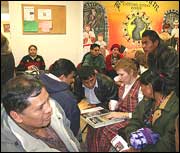Giving a hand to immigrants
'It is one thing to talk about immigration in the abstract and another to hear people's stories.'
“They’re very grateful,” he said, “and for me it’s gratifying work to do. They’re trying to make a better life for themselves, and I want to help them any way I can.”
Blacksten is a member of the Unitarian Universalist Church of Arlington, Virginia, and his computer lessons are just one of many ways his congregation connects with immigrants. The church also helps support an affordable housing co-op where many immigrants live. In addition, church members teach English to immigrants, help a Muslim community with immigration paperwork, and participate in an interfaith coalition that works on immigration issues.
The church also helps support a private human rights group that sends trained “accompaniers” to Guatemala to work with rural Mayans as they try to regain property and rights lost in that nation’s civil war and to protect their lands from development.
Arlington is in good company in its support of immigrants. Some UU congregations have long been involved with migrant issues and causes, and it seems certain that many more will be. The topic has never been more important. Or more timely.
Arizona’s anti-illegal immigration measure SB 1070, which took effect July 29, brought immigration to the top of the American political—and moral—agenda. At the Unitarian Universalist Association’s 2010 General Assembly in Minneapolis in June, delegates made immigration reform the new Study/Action Issue for congregations and resoundingly voted to hold General Assembly in Phoenix in 2012 to witness against oppressive measures taken against immigrants.
Groups of Unitarian Universalists from across the country have converged twice in Arizona in the last six months to learn about immigration issues and to stand with immigrant groups. In May UUs marched in Phoenix against SB 1070 and then returned July 29 to engage in civil disobedience with immigrant rights groups. Of more than eighty people arrested, twenty-nine were UUs.
With a number of states and cities considering laws like Arizona’s, the issue isn’t going away.
Middlebury, Vermont, may be only 90 minutes from an international border, but it’s not a place that immediately comes to mind when one thinks about immigrants. Yet, they’re there, thousands of them, many of them undocumented. Middlebury sits in the Champlain Valley, which is full of dairy farms that depend on workers who make the long trip up from Mexico and Central America.
Once in Vermont, the workers need help with transportation to get to grocery stores, medical appointments, and their children’s schools. Members of the Champlain Valley UU Society have begun helping with those transportation needs.
The Champlain UUs have also hosted visits by the Mexican Consulate’s office in Boston, which helps migrants with access to social and medical services and obtaining passports for trips home. “I like to think of our offering our space for this use as sanctuary,” said Ginny Moser, Champlain Valley’s Social Action chair. “The workers feel comfortable coming here.”
The Unitarian Universalists of Clearwater, Florida, have a long-standing history of working with immigrant groups. They have supported the Coalition of Immokalee Workers, immigrants who pick tomatoes in southern Florida, for more than a decade. Church members have joined protests at local supermarkets and corporation headquarters, written letters, marched in support of farm workers, and supported them financially and emotionally.
“What has worked best for us,” said Linda Stoller, chair of the congregation’s economic justice team, “is when we function in a support capability in this work. The farm workers tell us what they want to do, and we look at ways we can support that.”
The Clearwater congregation’s minister, the Rev. Abhi Janamanchi, said the work with the farm workers has changed the congregation over the years. “It has really brought home the different situations under which immigrant farm workers have to operate and survive, and also the tremendous grit and determination that helps them get through those situations.”
When Sheriff Joe Arpaio of Maricopa County, Arizona, came to a Kansas City, Missouri, suburb in mid-June to spread his “get tough with immigrants” message, the 126-member Unitarian Fellowship of Lawrence, Kansas, got thirty friends and members out to stand in opposition to him along with UUs from Kansas City and Overland Park, local immigrant groups, and others. Many wore the yellow T-shirts of the UUA’s “Standing on the Side of Love” campaign.
Two members of the fellowship have also served with No More Deaths, a group working on the Southwest border to prevent the deaths of immigrants as they trek across the desert. The fellowship also collected clothing to send to Mexico for people who have been picked up and deported.
Forrest Swall, chair of Lawrence’s Social Action Committee, believes most members of the fellowship are supportive of such efforts. “There are a few who can’t quite go there, and that’s OK too.”
He said the fellowship began to educate members two years ago. It joined an interfaith group focused on immigrant rights, the Kansas City-based Immigrant Justice Advocacy Movement, and held forums at the fellowship. As a result, said Swall, “I think we got out ahead of a lot of the negative rhetoric that has captured politics and the news media.”
Many of the early presentations were given by Dr. Marta Caminero-Santangelo, a member of the Lawrence fellowship whose parents immigrated from Cuba. She has volunteered twice with No More Deaths and has told stories about her experiences on the border. “What helped was telling the stories of real people,” she said. “It is one thing to talk about immigration in the abstract and another thing to hear people’s stories.”
See sidebar for links to related resources.
Comments powered by Disqus







